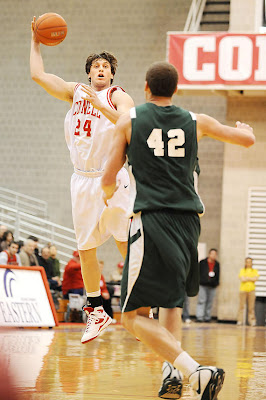If Ryan Wittman doesn't hear his name called in the second round of the 2010 NBA Draft on Thursday night, that's fine with him.
"I know it's a big possibility I don't get drafted, and that's fine," he said. "A lot of times it can almost be better not to get selected anyways because if you don't get drafted you can pick a spot that would be a good situation for you."
There's no question Wittman, a 6-foot-7 small forward who graduated from Cornell in May as the program's all-time leading scorer and the Ivy League's all-time leading 3-point shooter, can make a living playing basketball professionally. The question is, where?
Both Wittman and Jeff Foote, and Harvard's Jeremy Lin, have been working out for multiple NBA teams over the past few weeks in the buildup to Thursday night. Teams fly potential players to their facilities for workouts and interviews.
On Monday, Wittman worked out for the Minnesota Timberwolves, his hometown team and the franchise that employed his father, Randy, as an assistant coach from 1994-99 and a head coach from 2007-08.
On the team's website, assistant general manager Tony Ronzone assessed Wittman's workout.
"He can shoot it," Ronzone said. "He understands how to play. It's good to see local guys like that come in. He's a kid that someone can look at as a specialty player, come off the bench and make shots."
After hiring an agent, Wittman left his belongings at his Ithaca house and set up a training base in his hometown of Minneapolis. He's been working out daily with Jon Leuer, a 6-foot-10 forward from Wisconsin, which Cornell beat in the second round of the 2010 NCAA tournament.
The key for Wittman has been to keep his cardiovascular levels high. Without a full roster of teammates to push him in daily scrimmages, that has emerged as the primary concern.
But for Wittman, who departed Cornell with 2,028 points and 377 3-point field goals after starting for four years, adjusting to the NBA 3-point line initially caught him off guard. The NBA line is 23 feet, 9 inches, compared to the college line of 20-9.
"Even though during my college years I thought I shot a lot of NBA-range 3's, it wasn't quite as easy as I thought it would be," he said, laughing. "At this point now, after shooting every day, I feel I'm definitely comfortable."
The NBA Draft consists of two rounds and 60 selections. Kentucky's John Wall is expected to be the No. 1 pick, held by Washington, with Evan Turner of Ohio State a likely selection for Philadelphia at No. 2.
The last Ivy League player to be drafted was Penn's Jerome Allen in 1995. The last Ivy player taken in the first round was Princeton's Armond Hill in 1976.
Hill was taken ninth overall by the Atlanta Hawks. In 1985, Cornell's Ken Bantum was picked in the seventh round by the New York Knicks.
Several high profile mock drafts don't have Wittman, Foote or Lin on their boards. But if their names don't get called, they can still sign with an NBA team and play in one of four NBA summer leagues: in Las Vegas (July 9-18), Orlando (July 5-9), Utah (July 24-30) or Chicago (July 11-15). Those leagues are geared toward developing an NBA franchise's younger players.
NBA teams have praised Wittman for his shooting and intelligence; he said he's been told to work on his defense in one-on-one situations.
If he doesn't make an NBA roster, Wittman could end up playing in the NBA's development league or signing a contract with a team overseas.
Last week, Foote, a 7-foot center, signed a three-year deal with Maccabi Electra Tel Aviv, which plays in the top European and Israeli first leagues. He can still be drafted by an NBA team, which would then presumably work out a deal for Foote's playing rights.
Louis Dale, who played point guard on Cornell's back-to-back-to-back Ivy championship teams, expects to sign a deal with a team on foreign soil. He is working out with the Milwaukee Bucks on Wednesday, and expecting to return to Ithaca to watch the draft.






 9:15 AM
9:15 AM
 seo all
seo all



















